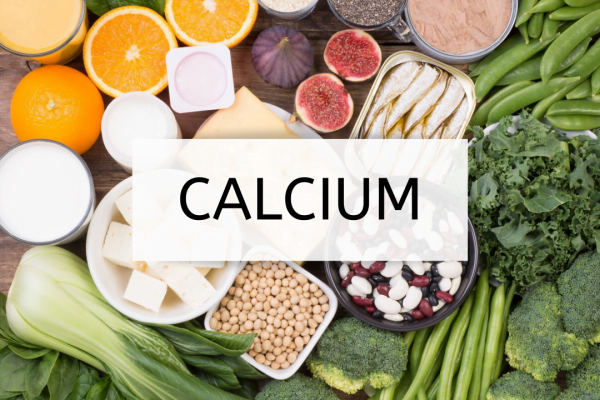Happy April everyone! I know life is a little hectic right now given the threat of covid-19. But I’m trying to make the best of it, as I hope you all are too.
Some of you may know, this is my birth month! My birthday is actually April 24. And although I won’t be having any real celebrations right now, I want to share my small celebrations with you! So, each week this month I am going to talk about one of my favourite things. And what better way to start the month with my favourite nutrient – magnesium!
What’s it good for?
Magnesium is one of the most abundant minerals in the human body and it’s super important! In fact, it’s involved in over 300 enzymatic processes in the body. It works closely with calcium, vitamin D and phosphorus, so it’s crucial for all of these nutrients to be balanced. Actually, if you remember reading my blog post about calcium, you may have already read about how these two minerals work together. Roughly 65% of all our magnesium is stored in our bones and teeth – which makes sense that this mineral works so well together with calcium. The remaining 35% is found in blood, fluids and other tissues.
It’s crucial for heart health
Magnesium is a natural muscle relaxer. In terms of heart health, it’s responsible for the relaxing pump in our heart. Calcium helps it contract and magnesium helps it relax. That’s why it’s crucial to have the right balance of these two minerals.
Its muscle relaxing abilities are also why magnesium helps lower blood pressure. When you don’t take enough magnesium, your blood vessels and arteries constrict, causing higher blood pressure. When magnesium is low, there is relatively too much calcium flowing to the vascular muscle, resulting in tighter muscles and higher blood pressure. Some studies even report that patients who died from heart attack or heart disease had lower magnesium levels.
It’s called the “anti-stress” mineral
Magnesium has been given this nickname and for good reason. As I mentioned above, it’s a natural muscle relaxer, for all muscles. It relaxes skeletal muscles, which can help if we’re feeling tensed or achy from stress or anxiety or even a strenuous workout. It also helps relax digestive muscles. This is helpful for individuals with GI disorders, such as IBS cramping. However, if too much is taken, it can relax the muscles too much and cause diarrhea.
Other health benefits
Because magnesium is involved in so many enzymatic processes, it makes sense that there are plenty of conditions that may benefit from magnesium supplementation. Two of the most notable, in my opinion, are the fact that it activates enzymes that are involved in protein and carbohydrate metabolism. It’s also necessary for DNA production and function. Pretty important stuff, I’d say!
Other conditions that may benefit from magnesium include: alcoholism, angina, anxiety, arrhythmias, atherosclerosis, autism, bronchial asthma, epilepsy, fatigue, hyperactivity, hypertension, insomnia, kidney stones, menstrual cramps, muscle cramps, osteoporosis and PMS symptoms like irritability, fatigue, depression, bloating, etc.
Sources of magnesium
“As iron is to hemoglobin, magnesium is to chlorophyll, the ‘blood’ pigment of plants.”
Magnesium is found in many different types of food, but one of the best sources is dark green vegetables. It’s also found in leafy greens, nuts, seeds, legumes, whole grains, avocados, and chocolate.
Ladies, have you ever noticed that when you’re approaching your period, you crave chocolate? This is because your brain knows that you get magnesium from dark chocolate! Your brain is extremely smart at telling you what it needs.
Unfortunately, due to modern farming practices, our soils aren’t as fertile and healthy. The swiss chard of today contains less magnesium than it did 100 years ago. This is true for almost all nutrients found in plant foods, by the way.
Processing also damages magnesium content in our foods. Soaking and boiling foods, like broccoli, leaches magnesium out of the food. But this water is like liquid gold! A good tip is to save this “vegetable water” and use it to cook rice or even save it to water your plants. Mineral recycling can be extremely beneficial. It’s also important to remember that nutrients in whole grains are damaged during processing as well.
Reasons for depletion
Unfortunately, there are a lot of methods for magnesium to be depleted from the body. But the good news is, a lot of them can be completely avoided.
Drinking softened water pulls magnesium from the body. This is common in geographical areas that use hard drinking water. The home I stayed in during my undergrad had a water softener due to extremely hard well water from the city. One way to somewhat counteract this is by using a water filter of some sort.
Diuretic pills, alcohol and caffeine deplete magnesium as well. I’m going to be blunt… The more you pee, the more nutrients you lose. Nutrients are pulled out of the body every time you go to the bathroom, whether its number 1 or number 2.
Sugar also deplete the body of magnesium. High blood sugar and therefore elevated insulin levels decrease magnesium absorption into the cells. The kidneys then excrete this extra and unused magnesium out of the body.
Birth control also depletes the body of magnesium (as well as many other vitamins and minerals). I’ve linked my video here where I talk about how the pill is ruining your nutrition, and why I’ve decided to stop taking it. In short, through its effects on your hormones and other processes in your body, birth control depletes your stores of many essential nutrients.
Finally, stress causes a large loss in magnesium. Have you ever noticed in times of extreme stress and anxiety that your heart starts to beat irregularly? You think “this is it, it’s the end,” but it’s probably not. It’s simply a symptom of low magnesium levels. And like I mentioned before, low magnesium leads to increased anxiety, so it’s a never-ending cycle. The good news is, there are very easy and effective ways to manage stress.
Should I supplement with magnesium?
Unfortunately, magnesium deficiency is quite common, so for the average person, yes, supplementation is a good idea. But as always, check with your primary health professional before starting any new supplements.
To date, there are no reported cases of magnesium toxicity, that I am aware of. The body excretes any excess magnesium in urine and feces. Although I don’t recommend it for the average person, it is generally regarded as safe to take up to 1000mg/day. And while this mineral is generally very safe, there is still possibility of toxicity symptoms to occur, especially if there is imbalance with calcium, phosphorus and vitamin D.
Some signs of magnesium toxicity include depression of the central nervous system causing muscle weakness, fatigue, sleepiness and hyperexcitability. However, magnesium deficiency is much more common, Early symptoms of deficiency include fatigue, anorexia, irritability, insomnia, muscle tremors, twitching, psychological changes (including apathy, decreased learning ability, confusion and poor memory), rapid heartbeat and high blood pressure.
I don’t usually like to give a general recommended intake for magnesium, as it completely differs for everyone and depends on what type you take and what you’re taking it for. For laxative purposes, magnesium citrate, sulfate and carbonate are probably the best forms to take. For other purposes, I like taking glycinate or bisglycinate. These two forms are chelated with amino acids, allowing the body to absorb them much better. However, as a baseline I like to tell clients to start around 150-200g per day and increase slowly if necessary.
Another pro tip I have regarding magnesium supplementation is to take it before bed on an empty stomach. It’s been proven that taking magnesium before bed causes people to have a better sleep. Magnesium also needs stomach acid for better absorption and meals high in protein and fat decreased magnesium absorption. So, it makes sense to take it on an empty stomach before bed for best absorption.
If you’re interested in purchasing professional grade supplements, check out my online store! All supplements are delivered directly to your door for a small flat fee.
I hope you guys enjoyed this blog! I look forward to sharing more of my favourites with all of you. And I hope you all are staying safe (and sane) at home during this pandemic.
If you liked this post, don’t forget to subscribe to my newsletter and be sure to share it to all your friends!





Your method of explaining the whole thing in this post is in fact pleasant, everyone be capable of effortlessly be aware of it, Thanks a lot.